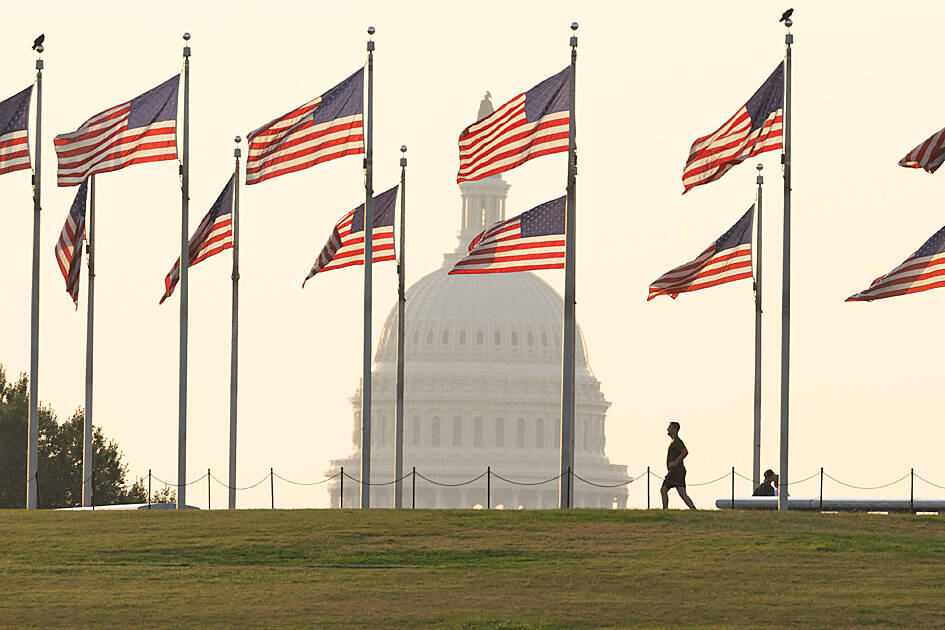The US House of Representatives on Wednesday passed the “Sanctions on the Chinese Communist Party’s (CCP) Tyranny and Oppression Act” by a vote of 243 to 174.
The legislation — referred to as the Stop CCP Act — enables the “imposition of sanctions on members of the National Communist Party Congress of the People’s Republic of China.”
The act says that the CCP, led by Chinese President Xi Jinping (習近平), is responsible for “violations of Hong Kong’s autonomy,” “increased aggression against the people of Taiwan” and “acts of repression and genocide against Uighur Muslims.”

Photo: EPA-EFE
The text of the proposed law states that if the US president decides that “sanctionable conduct” has taken place, then members of the CCP’s central committee — the party’s main leadership organization composed of about 200 permanent and 160 alternating members — shall be prohibited from buying or selling property in the US.
Furthermore, those leading communist cadres would be ineligible to receive an entry visa to the US or would have existing visas revoked.
The sanctions outlined in the act may also be applied to any “adult family members” of the top-ranking party member and their spouse.
In the text of the act, “sanctionable conduct” is defined as actions that play a “significant role in the development or implementation” of policies that “violate the autonomy of Hong Kong,” “harass, intimidate or result in increased aggression towards the people of Taiwan” or “contribute to political oppression or violation of human rights of individuals or societal groups within the People’s Republic of China, including Uighur Muslims.”
Crucially, the US president must “determine” whether such “sanctionable conduct” has occurred for the measures to go into effect.
Taiwan is mentioned repeatedly in the act sponsored by Republican Representative Lisa McClain of Michigan.
“Since the election of [former] president Tsai Ing-wen [蔡英文] as president of Taiwan in 2016, the Government of the People’s Republic of China has intensified its efforts to pressure Taiwan through diplomatic isolation and military provocations,” the act says.
“The rapid modernization of the People’s Liberation Army and recent military maneuvers in and around the Taiwan Strait illustrate a clear threat to Taiwan’s security,” it adds.
The act also reiterates key aspects of the Taiwan Relations Act, highlighting that the US is required by its own law to “maintain the capacity of the United States to resist any resort to force or other forms of coercion that would jeopardize the security, or the social or economic system, of the people on Taiwan.”
Now that the bill has passed the House, it is set to go to the Senate for deliberation.
If the Senate approves after returning from recess on Nov. 12, the bill may be signed into law by the president.
The passing of the Stop CCP Act follows other legislation targeting top-ranking members of China’s ruling party, many of whom own extensive financial assets in the US despite party propaganda organs frequently denouncing the country.
On Sept. 9, the House also passed the Taiwan Conflict Deterrence Act that would “restrict financial services for certain immediate families” of CCP officials if Beijing attacks Taiwan.

The CIA has a message for Chinese government officials worried about their place in Chinese President Xi Jinping’s (習近平) government: Come work with us. The agency released two Mandarin-language videos on social media on Thursday inviting disgruntled officials to contact the CIA. The recruitment videos posted on YouTube and X racked up more than 5 million views combined in their first day. The outreach comes as CIA Director John Ratcliffe has vowed to boost the agency’s use of intelligence from human sources and its focus on China, which has recently targeted US officials with its own espionage operations. The videos are “aimed at

STEADFAST FRIEND: The bills encourage increased Taiwan-US engagement and address China’s distortion of UN Resolution 2758 to isolate Taiwan internationally The Presidential Office yesterday thanked the US House of Representatives for unanimously passing two Taiwan-related bills highlighting its solid support for Taiwan’s democracy and global participation, and for deepening bilateral relations. One of the bills, the Taiwan Assurance Implementation Act, requires the US Department of State to periodically review its guidelines for engagement with Taiwan, and report to the US Congress on the guidelines and plans to lift self-imposed limitations on US-Taiwan engagement. The other bill is the Taiwan International Solidarity Act, which clarifies that UN Resolution 2758 does not address the issue of the representation of Taiwan or its people in

US Indo-Pacific Commander Admiral Samuel Paparo on Friday expressed concern over the rate at which China is diversifying its military exercises, the Financial Times (FT) reported on Saturday. “The rates of change on the depth and breadth of their exercises is the one non-linear effect that I’ve seen in the last year that wakes me up at night or keeps me up at night,” Paparo was quoted by FT as saying while attending the annual Sedona Forum at the McCain Institute in Arizona. Paparo also expressed concern over the speed with which China was expanding its military. While the US

SHIFT: Taiwan’s better-than-expected first-quarter GDP and signs of weakness in the US have driven global capital back to emerging markets, the central bank head said The central bank yesterday blamed market speculation for the steep rise in the local currency, and urged exporters and financial institutions to stay calm and stop panic sell-offs to avoid hurting their own profitability. The nation’s top monetary policymaker said that it would step in, if necessary, to maintain order and stability in the foreign exchange market. The remarks came as the NT dollar yesterday closed up NT$0.919 to NT$30.145 against the US dollar in Taipei trading, after rising as high as NT$29.59 in intraday trading. The local currency has surged 5.85 percent against the greenback over the past two sessions, central